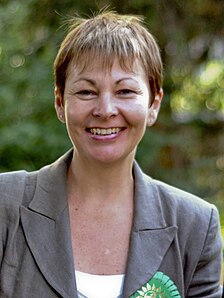
The Greens was a green-ecologist political party in France. The Greens had been in existence since 1984, but their spiritual roots could be traced as far back as René Dumont's candidacy for the presidency in 1974. On 13 November 2010, The Greens merged with Europe Ecology to become Europe Ecology – The Greens.

The Green Party of England and Wales is a green, left-wing political party in England and Wales. Since October 2021, Carla Denyer and Adrian Ramsay have served as the party's co-leaders. The party currently has one representative in the House of Commons and two in the House of Lords, in addition to hundreds of councillors at the local government level and three members of the London Assembly.
The New Zealand Labour Party, or simply Labour, is a centre-left political party in New Zealand. The party's platform programme describes its founding principle as democratic socialism, while observers describe Labour as social-democratic and pragmatic in practice. The party participates in the international Progressive Alliance. It is one of two major political parties in New Zealand, alongside its traditional rival, the National Party.
Green politics, or ecopolitics, is a political ideology that aims to foster an ecologically sustainable society often, but not always, rooted in environmentalism, nonviolence, social justice and grassroots democracy. It began taking shape in the western world in the 1970s; since then Green parties have developed and established themselves in many countries around the globe and have achieved some electoral success.

The Leader of the Green Party of England and Wales is the most senior political figure within the Green Party of England and Wales. The role was introduced alongside that of deputy leader in 2008. Prior to this, the party's public spokespersons were principal speakers. There were two principal speakers, one female and one male, who were elected annually at the Green Party's Autumn Conference and held no vote on the Green Party Executive (GPEx).

The Radical Party was a liberal and libertarian political party in Italy. For decades, the Radical Party was a bastion of anti-clericalism, civil libertarianism, liberalism and radicalism in Italy as well as environmentalism. The party proposed itself as the strongest opposition to the Italian political establishment, seen as corrupt and conservative. Although it never reached high shares of vote and never participated in government, the party had close relations with the other parties of the Italian left—from the Republicans and the Socialists to the Communists and Proletarian Democracy—and opened its ranks also to members of other parties through dual membership.

The Green Party, also known as the Green Party UK, was a Green political party in the United Kingdom.

The Northern Ireland Labour Party (NILP) was a political party in Northern Ireland which operated from 1924 until 1987.
Friends of the Earth England, Wales and Northern Ireland is one of 75 national groups around the world which make up the Friends of the Earth network of environmental organisations. It is usually referred to as just 'Friends of the Earth' within its home countries.

Sir Jonathon Espie Porritt, 2nd Baronet, CBE is a British environmentalist and writer. He is known for his advocacy of the Green Party of England and Wales. Porritt frequently contributes to magazines, newspapers and books, and appears on radio and television.

Derek Norman Wall is a British politician and former member of the Green Party of England and Wales. He was the joint International Coordinator for the Green Party and stood against Prime Minister Theresa May as the Maidenhead Green candidate in the 2017 general election. Formerly the party's Principal Speaker, he is known as a prominent eco-socialist, campaigning both for environmentalism and socialism. Alongside his political role, Wall is an academic and a writer, having published on the subject of ecosocialism and the wider Green politics movement. He is a contributor to the Morning Star newspaper and a blogger.

Cornwall is administered as a county of South West England whose politics are influenced by a number of issues that make it distinct from the general political scene in the wider United Kingdom, and the political trends of neighbouring counties. Its position on the geographical periphery of the island of Great Britain is also a factor.
Sara Parkin is a Scottish nurse and political activist. She started her working life as a nurse in Edinburgh but rose to prominence as a green political activist during and after the 1989 European Parliament election, in which the UK Green Party gained 15% of the votes but no seats. She resigned from the party in 1992, at odds with the party's anti-leadership stance, and went on to found the Forum for the Future with Jonathon Porritt and Paul Ekins. Her current campaigning focus is sustainability literacy as an essential outcome of formal education, especially in universities and colleges. She lives in Hackney, East London.
Jonathan Tyler is a Green Party activist and academic.

The British Left is a range of political parties and movements in the United Kingdom. These can take the position of either centre-left, left-wing or far-left.

The 2008 Green Party of England and Wales leadership election took place in September 2008 to select the first leader of the Green Party of England and Wales. It was won by Caroline Lucas who received 92.4% of the vote. At the same time, Adrian Ramsay was elected unopposed as the party's first deputy leader.
A group of people in the North East of England started the Ecology Party. They were North East Durham Ecology Party. They were the only people recycling they collected used newspapers and hand delivered them to a private firm. Who purchased the used papers to recycle into paper. This was the only recycling happening at the time!
The PEOPLE Party was a political party in the United Kingdom, founded in February 1972. It was the first Green political party in the United Kingdom and Europe as a whole, and the political predecessor of the Green Party of England and Wales, the Scottish Greens and the Green Party Northern Ireland.
The Green Party in the United Kingdom may refer to one or all three Green political parties in the United Kingdom:-

The Campaign for Nuclear Disarmament (CND) is an organisation that advocates unilateral nuclear disarmament by the United Kingdom, international nuclear disarmament and tighter international arms regulation through agreements such as the Nuclear Non-Proliferation Treaty. It opposes military action that may result in the use of nuclear, chemical or biological weapons and the building of nuclear power stations in the UK.













